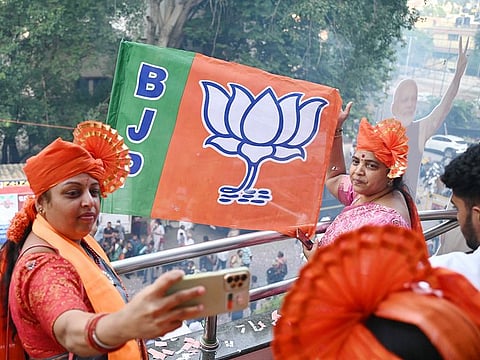Why the world’s largest political party still needs help of a volunteer organisation
Alienating the RSS was a mistake that cost the BJP dear in India's 2024 general elections

Soon after the Bhartiya Janta Party (BJP) won the first single-party majority in 2014, they went on a party expansion drive. It was a counter-intuitive thing to do: most parties worry about the organisation when they are doing badly in elections, not when they have just won a historic victory.
But the BJP, under prime minister Narendra Modi and party president Amit Shah, had much bigger plans than what they had just achieved. Having recently seen the collapse of Congress-led UPA-2, they wanted to use power to gain more power. They had state elections to win, new territories to expand to, buying insurance in states like Bengal, Odisha Telangana, for a future when the Hindi heartland would get bored of them.
Within a few years the BJP announced it had become the world’s largest political party, surpassing the Communist Party of China. They even sent delegations to China to study their party organisation model.
“The New BJP”
The BJP’s focus on organisation helped them win many elections, such as Uttar Pradesh in 2017, Haryana in 2014, beating anti-incumbency in Uttarakhand in 2022. Without the organisation, it would not have been possible to convert Modi’s popularity on the ground.
Which begs the question, how could the BJP have suffered surprise upsets in Uttar Pradesh, Maharashtra, West Bengal and the fortress of Rajasthan with this formidable party organisation? How did 21 workers per booth miss the public mood?
The art of listening
The short answer is arrogance, which we may call overconfidence if we want to be polite.
It is not just the top leadership but even the last party worker who had become arrogant and overconfident. The success had gone to their heads. They internalised the narrative that they were invincible, teflon-coated, and had defied the laws of anti-incumbency and even gravity. Isaac Newton knew better.
Complaints by voters to party workers, and party workers to leaders, were not being taken seriously. They were not being addressed. A classic example of this was the disenchantment of Rajput voters. The party appeared to be tone-deaf, because they thought they were sweeping the elections anyway.
The longer answer is that today’s BJP thinks of communication as a one-way process. The party speaks, the public listens. Party workers, like the media, are nothing more than amplifiers of what the party has to say. It doesn’t work that way, as “240” has shown. Communication is a two way process.
A third issue here is that the size of the party organisation, seen as a strength, itself becomes a weakness. It is not possible for the party to keep these many workers happy all the time. They all want promotions in the organisation, they all want election tickets for leaders they are attached to, they all want patronage and power.
Also Read: To fix India’s rape problem, fix governance
Unhappy workers do more damage than the absence of workers. The art of sabotage comes easily to them. The BJP couldn’t have lost so many sitting seats in the Hindi heartland if those 20 workers per booth weren’t sabotaging their own party.
This writer met workers in UP who were silently telling their social networks to vote against the BJP, for complaints ranging from poor candidate selection by the BJP to unemployment. When a slice of society becomes the party, is the party controlled by society or the centralised party leadership?
Why the BJP still needs RSS
When the BJP started its massive membership drive in 2014-15, this writer’s first thought was that the Rashtriya Swayamsevak Sangh isn’t going to be happy about it. The RSS’ raison d’être is that RSS workers make the BJP win. The near-invisible RSS network in society goes around persuading people to vote for the BJP. This role was always a little exaggerated, and the RSS goes out of the way to take credit.
Yet, “240” has shown why the “world’s largest political party” still needs the aid of its parent organisation. The importance of the RSS is less in the headcount of the workers who campaign and more in the independent feedback they bring to the BJP, the ideological motivation and the ability to keep core voters intact.
We can be sure never ever to hear such a sentiment coming from a BJP leader in future.
Sign up for the Daily Briefing
Get the latest news and updates straight to your inbox




